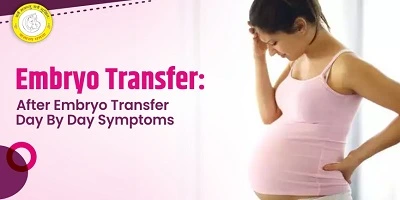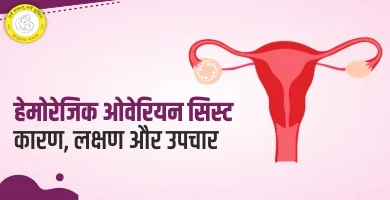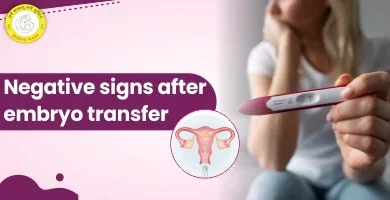Positive Signs After Embryo Transfer: A Quick Guide

The days after the embryo transfer are really difficult, full of emotions such as hope, anxiety and anticipation, asking yourself what’s going on your body. While waiting for the test results during this phase, one may feel the urge to search for positive signs after embryo transfer.
But please bear in mind that each woman is unique and therefore, these signs may differ from one woman to the other. Perhaps it would be helpful now to go through what one might encounter and what this means.
Understanding Embryo Transfer
In this Article
Embryo transfer is one of the most crucial and last steps of the IVF treatment procedure. After your eggs are fertilized, the embryos are carefully placed into your uterus, with the hope that they will implant and begin to grow. This process is delicate and, while scientific, is also deeply emotional representing the intersection of technology and human hope. However, many couples forget to ask about what happens after embryo transfer, including the positive signs and negative signs after embryo transfer.
What Should Be Expected Immediately After Embryo Transfer
After Embryo transfer procedure, you may be experiencing mild contractions or soreness, like the pain you feel during your periods. You might also feel completely detached, or experience numbing, which is also perfectly fine. These early hours and days are all about: sleep and rest, both for the body and the mind. It is not easy to do this, but one should not get too worried about every twinge or sensation experienced.
Embryo Transfer Success Rates
In statistical terms, success is conditioned by factors such as age, quality of the embryo, and the client’s previous medical history. For people less than 35 years of age, success rates are relatively high, roughly ranging from 40% to 60%, nonetheless, percentages do not capture an individual’s narrative. Each of the embryo transfers is different and, therefore, despite the statistical information, this need cannot accurately estimate the desire and determination of a person.
Common Positive Signs After Embryo Transfer
It is very obvious to wait anxiously for any positive signs after embryo transfer, it brings good news. You must know that these signs do not guarantee success but are the most common when it is good news. Let’s check them out!
1. Spotting or Light Bleeding
Look for spotting. Implantation bleeding can occur when the embryo attaches to the uterine wall. It’s often very light and brief.
2. Mild Cramping
If you are feeling mild cramps similar to period pain, this can indicate uterus adjusting or implantation. So it might be a sign.
3. Tiredness or Fatigue
The body starts working hard to support early pregnancy, leaving you feeling more tired than usual.
4. Breast Tenderness
Hormonal changes might cause your breasts to feel swollen or tender.
5. Frequent Urination
Rising hormone levels can make you run to the bathroom more often than usual.
Don’t worry if you don’t notice these signs—everyone’s body is different. Also Read: (How Is IVF Pregnancy Different from Normal Pregnancy?)
Emotional Changes and Their Importance
The emotional side of this process is just as significant as the physical. You might feel hopeful one moment and anxious the next. Some women even feel guilty for being too optimistic or too pessimistic. It’s important to give yourself permission to feel everything. Your emotional well-being during this period is as important as anything else. Surround yourself with people who support you, and allow yourself moments of rest, joy, and reflection.
When to Take a Pregnancy Test After Embryo Transfer
The hardest part? Waiting to take a pregnancy test. You might be tempted to test early, but it’s best to wait 10 to 14 days after Embryo Transfer for an accurate result. Testing too soon can lead to false negatives or positives due to lingering hormones from fertility medications.
Boosting Your Success Rate After Embryo Transfer
Is there anything you can do to increase pregnancy after embryo transfer. While much of the outcome is beyond your control, focusing on what you can control—like staying hydrated, resting, and managing stress—can help. Small actions, like eating a balanced diet or practicing mindfulness, can help you feel more grounded and supported through the process.
Lifestyle Tips for Successful Embryo Transfer
Here are practical lifestyle tips to help improve your chances of a successful embryo transfer:
Gentle Movement
Engage in light activities like short walks to improve blood flow and reduce stress without putting too much strain on your body.
Nutritious Foods
Focus on eating a balanced diet rich in vitamins, minerals, and antioxidants. Include fresh fruits, vegetables, whole grains, lean proteins, and healthy fats.
Stay Hydrated
Drink plenty of water to support overall health and maintain hydration, which is essential for your body’s healing and functioning.
Mindful Rest
Prioritize rest and relaxation but avoid total bed rest. Listen to your body and allow it to recover without overexerting.
Stress Management
Practice mindfulness, meditation, or gentle breathing exercises to keep your stress levels in check. Stay emotionally calm and centered.
Avoid Harmful Substances
Stay away from alcohol, smoking, caffeine, and other substances that could negatively affect your body and embryo implantation.
Create a Calm Environment
Surround yourself with things that bring you peace, whether it’s soft music, reading, or spending time in nature..
Listen to Your Body
Tune into your body’s signals. If something doesn’t feel right or if you’re unsure about an activity, rest and consult your doctor for guidance.
Next Steps After Noticing Positive Signs Embryo Transfer
If you begin noticing positive signs after embryo transfer, stay calm and follow your doctor’s guidance. The urge to jump to conclusions or take early tests is strong, but patience is key. Keep your care team informed of any symptoms and take things day by day.
How Can Diwya Vatsalya Mamta IVF Help You?
At Diwya Vatsalya Mamta IVF, we are very much aware that going to an IVF treatment is not just a light decision for those who are seeking the procedure. Our professional staff is ready not only to provide some of the best healthcare services but also to address your concerns as far as your well-being is concerned. We are one of the best IVF Treatment Centre in Patna with affordable cost and high success rate. Get in touch with us for more information.
Conclusion
The days after an embryo transfer are some of the longest in an IVF journey, filled with hope and the desire to see those “positive signs after embryo transfer.” But the journey is deeply personal, and the lack of symptoms doesn’t equate to failure. Stay patient and kind to yourself—you’re doing something extraordinary. Whatever the outcome, you’ve shown incredible strength and resilience.
FAQs
Can I feel implantation after embryo transfer?
You can check out for signs like light bleeding or cramping. However, the signs are not always there.
Is it normal not to experience any symptoms after embryo transfer?
Yes, the absence of symptoms doesn’t mean the transfer wasn’t successful. The journey is different for different individuals. Be positive and have faith.
What can I do to improve my chances after the transfer?
Rest, avoid stress, maintain a healthy diet, and follow your doctor’s instructions. Focus on gentle self-care.
How long should I wait before taking a pregnancy test?
It’s best to wait 10-14 days after the transfer to avoid false results due to fertility medications.
What kind of bleeding is a good sign after embryo transfer?
Light spotting, often referred to as implantation bleeding, can be a positive sign. However, if you experience heavy bleeding, contact your doctor.
Can stress affect embryo implantation?
While stress alone is unlikely to affect the outcome, reducing stress can help you feel more relaxed and supported during this emotional time.
Are cramps after embryo transfer a positive sign?
Mild cramping can indicate implantation, but it can also result from the procedure itself. Monitor the severity and consult your doctor if you’re concerned.
What should I avoid doing after an embryo transfer?
Avoid strenuous activities, heavy lifting, alcohol, smoking, and anything that might increase stress on your body.
After Embryo Transfer Day By Day Symptoms
Common day-to-day symptoms after embryo transfer may include mild cramping, spotting, bloating, breast tenderness, fatigue, and mood swings.



